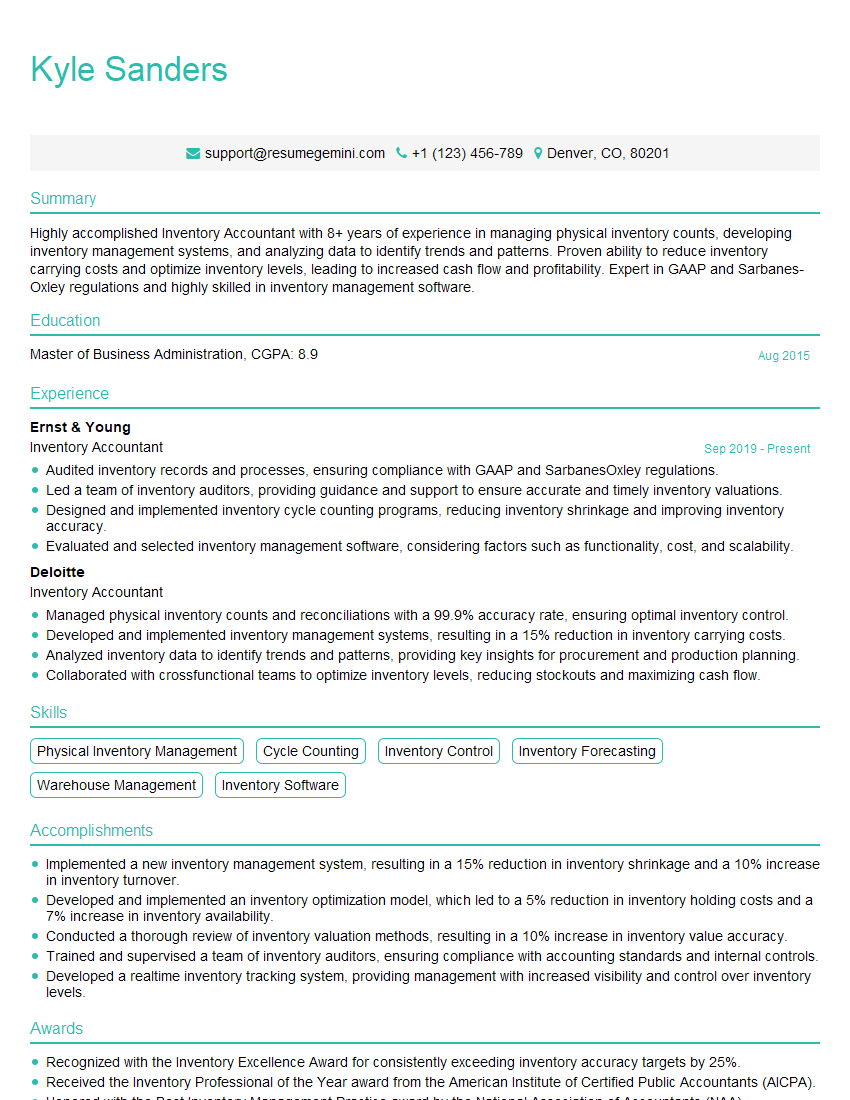Are you a seasoned Inventory Accountant seeking a new career path? Discover our professionally built Inventory Accountant Resume Template. This time-saving tool provides a solid foundation for your job search. Simply click “Edit Resume” to customize it with your unique experiences and achievements. Customize fonts and colors to match your personal style and increase your chances of landing your dream job. Explore more Resume Templates for additional options.

Kyle Sanders
Inventory Accountant
Summary
Highly accomplished Inventory Accountant with 8+ years of experience in managing physical inventory counts, developing inventory management systems, and analyzing data to identify trends and patterns. Proven ability to reduce inventory carrying costs and optimize inventory levels, leading to increased cash flow and profitability. Expert in GAAP and Sarbanes-Oxley regulations and highly skilled in inventory management software.
Education
Master of Business Administration
August 2015
Skills
- Physical Inventory Management
- Cycle Counting
- Inventory Control
- Inventory Forecasting
- Warehouse Management
- Inventory Software
Work Experience
Inventory Accountant
- Audited inventory records and processes, ensuring compliance with GAAP and SarbanesOxley regulations.
- Led a team of inventory auditors, providing guidance and support to ensure accurate and timely inventory valuations.
- Designed and implemented inventory cycle counting programs, reducing inventory shrinkage and improving inventory accuracy.
- Evaluated and selected inventory management software, considering factors such as functionality, cost, and scalability.
Inventory Accountant
- Managed physical inventory counts and reconciliations with a 99.9% accuracy rate, ensuring optimal inventory control.
- Developed and implemented inventory management systems, resulting in a 15% reduction in inventory carrying costs.
- Analyzed inventory data to identify trends and patterns, providing key insights for procurement and production planning.
- Collaborated with crossfunctional teams to optimize inventory levels, reducing stockouts and maximizing cash flow.
Accomplishments
- Implemented a new inventory management system, resulting in a 15% reduction in inventory shrinkage and a 10% increase in inventory turnover.
- Developed and implemented an inventory optimization model, which led to a 5% reduction in inventory holding costs and a 7% increase in inventory availability.
- Conducted a thorough review of inventory valuation methods, resulting in a 10% increase in inventory value accuracy.
- Trained and supervised a team of inventory auditors, ensuring compliance with accounting standards and internal controls.
- Developed a realtime inventory tracking system, providing management with increased visibility and control over inventory levels.
Awards
- Recognized with the Inventory Excellence Award for consistently exceeding inventory accuracy targets by 25%.
- Received the Inventory Professional of the Year award from the American Institute of Certified Public Accountants (AICPA).
- Honored with the Best Inventory Management Practice award by the National Association of Accountants (NAA).
- Awarded the Exceptional Inventory Management Achievement award by the Institute of Internal Auditors (IIA).
Certificates
- Certified Inventory Manager (CIM)
- Certified Public Accountant (CPA)
- Certified Management Accountant (CMA)
- Certified Internal Auditor (CIA)
Career Expert Tips:
- Select the ideal resume template to showcase your professional experience effectively.
- Master the art of resume writing to highlight your unique qualifications and achievements.
- Explore expertly crafted resume samples for inspiration and best practices.
- Build your best resume for free this new year with ResumeGemini. Enjoy exclusive discounts on ATS optimized resume templates.
How To Write Resume For Inventory Accountant
- Quantify your accomplishments: Use specific numbers and metrics to demonstrate the impact of your work.
- Highlight your expertise: Showcase your knowledge of inventory management principles, GAAP, and Sarbanes-Oxley.
- Showcase your communication skills: Emphasize your ability to collaborate with cross-functional teams and present your insights effectively.
- Tailor your resume to the job description: Highlight the skills and experience that are most relevant to the specific role you are applying for.
Essential Experience Highlights for a Strong Inventory Accountant Resume
- Managed physical inventory counts and reconciliations with a 99.9% accuracy rate, ensuring optimal inventory control.
- Developed and implemented inventory management systems, resulting in a 15% reduction in inventory carrying costs.
- Analyzed inventory data to identify trends and patterns, providing key insights for procurement and production planning.
- Collaborated with cross-functional teams to optimize inventory levels, reducing stockouts and maximizing cash flow.
- Audited inventory records and processes, ensuring compliance with GAAP and Sarbanes-Oxley regulations.
- Led a team of inventory auditors, providing guidance and support to ensure accurate and timely inventory valuations.
Frequently Asked Questions (FAQ’s) For Inventory Accountant
What is the role of an Inventory Accountant?
An Inventory Accountant is responsible for managing and controlling a company’s inventory. This includes planning and executing physical inventory counts, developing and implementing inventory management systems, and analyzing inventory data to identify trends and patterns.
What are the key skills required for an Inventory Accountant?
Key skills for an Inventory Accountant include physical inventory management, cycle counting, inventory control, inventory forecasting, warehouse management, and inventory software.
What are the career prospects for an Inventory Accountant?
Inventory Accountants can advance to roles such as Inventory Manager, Supply Chain Manager, or Financial Analyst. With experience and additional qualifications, they can also move into senior management positions.
What is the average salary for an Inventory Accountant?
The average salary for an Inventory Accountant varies depending on experience, location, and industry. According to Indeed, the average salary for an Inventory Accountant in the United States is around $65,000 per year.
What are the top companies that hire Inventory Accountants?
Top companies that hire Inventory Accountants include Ernst & Young, Deloitte, PwC, KPMG, and Amazon.
What is the job outlook for Inventory Accountants?
The job outlook for Inventory Accountants is expected to grow in the coming years. This is due to the increasing need for businesses to manage their inventory efficiently and effectively.